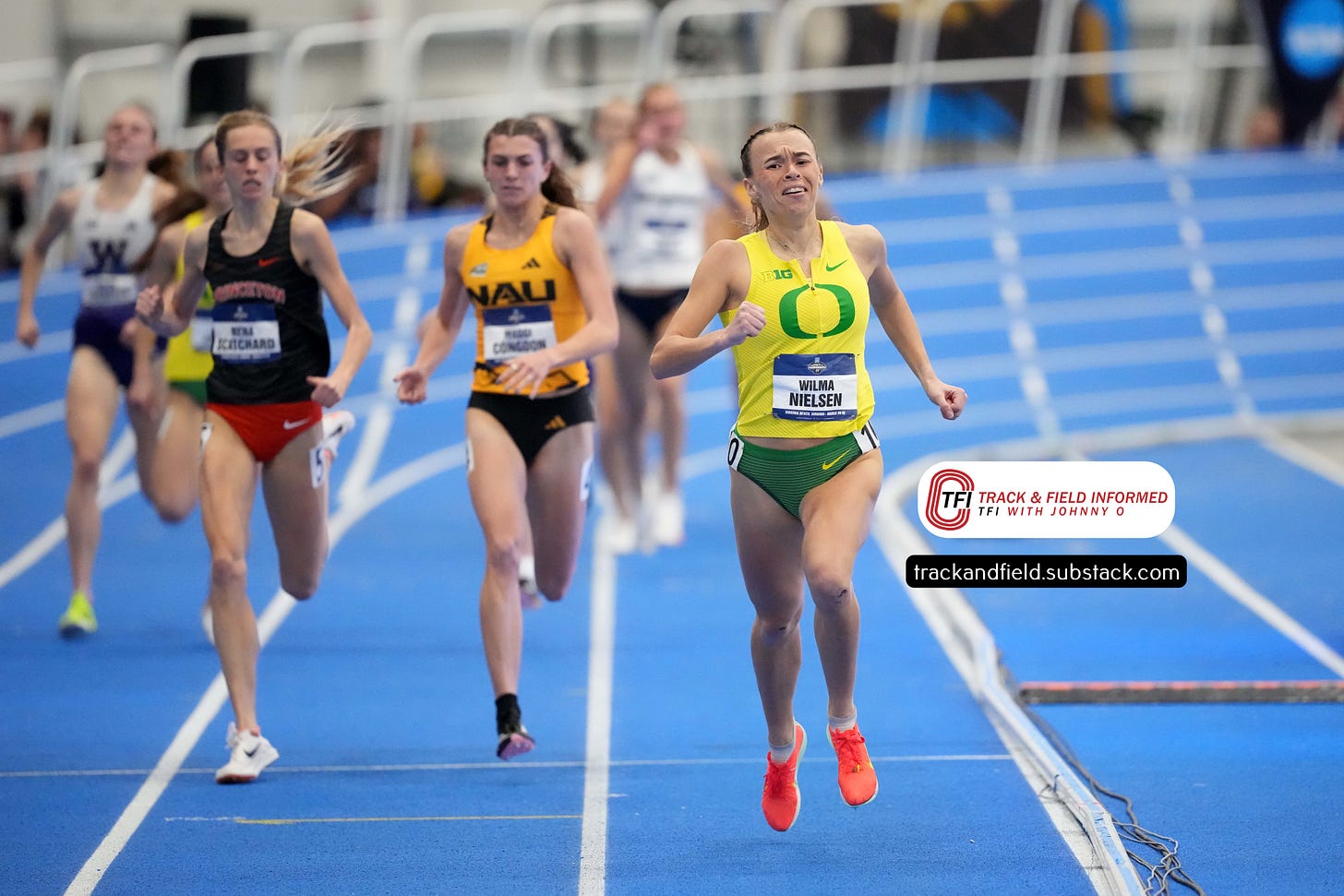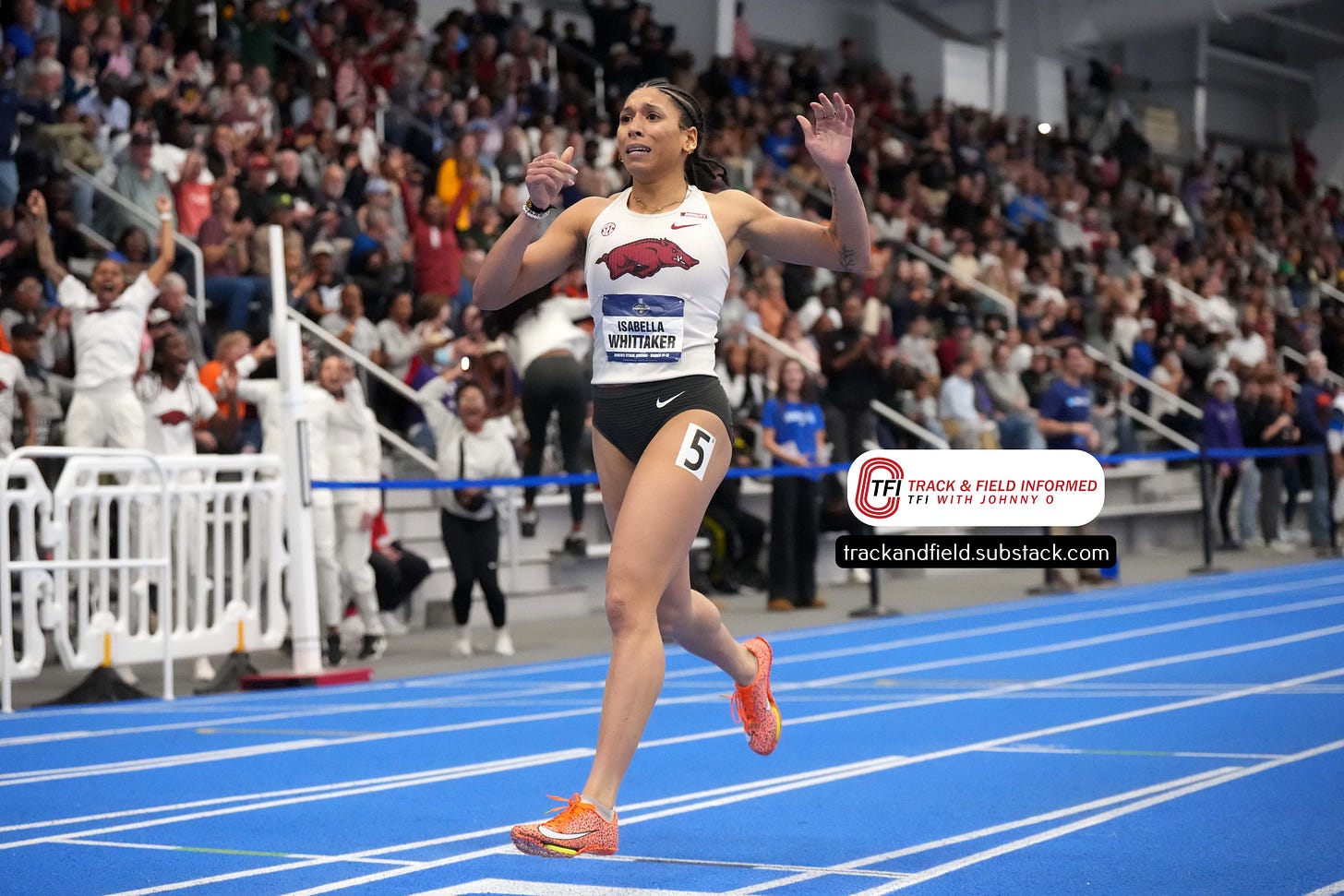Oregon runs away with women's title in NCAA Indoor Champs
Ducks total 47 points on meet's final day while winning eighth championship

On an afternoon when Isabella Whittaker of the University of Arkansas gave the world record in the 400 meters a scare, Oregon won its eighth women’s team title in the NCAA Indoor Track & Field Championships in Virginia Beach, Virginia, on Saturday.
Paced by a 1-4 finish from juniors Wilma Nielsen and Silan Ayyildiz in the mile, Oregon produced a win, four second-place finishes, and a fourth on the second day of the two-day meet while rolling to a 55-39 victory over second-place Georgia. USC finished third with 35 points, while two-time defending champion Arkansas, Oklahoma, and Washington tied for fourth with 31 points.
“We knew we had a lot of pieces in a lot of different events, but you have to get to the finals first,” Oregon coach Jerry Schumacher told ESPN’s John Anderson. “So we took day one and just said, ‘We got to make sure we’re ready for day two,’ And once we got to day two, we knew that if we started off hot, we could just keep squeezing. And they exceeded our form charts the entire way. So yeah, it worked out great.”
Oregon, which had won its seventh title in eight years in the 2017 NCAA championships, had totaled eight points on Friday by finishing second in the distance medley relay.
The Ducks’ point total doubled early in the afternoon on Saturday when senior Jaida Ross finished second in the shot put with a best of 18.98 meters (62 feet 3¼ inches) in a competition that was dominated by Nebraska junior Axelina Johansson, who had a best of 19.28 (63-3¼), as well as two other puts that exceeded 19 meters (62-4).
The mile was the first track race of the women’s session and after Nielsen and Ayyildiz accounted for 15 points while finishing first in 4:32.40 and fourth in 4:33.98, respectively, Oregon found itself with a 31-26 lead over second-place Washington.
That advantage increased to 13 points in the following event, the 60-meter dash, when senior Jadyn Mays ran 7.12 to place second to USC junior Dajaz Defrand, who clocked a personal best of 7.09.
Oregon did not have any performers in the next two track events, the 400 and 800, but the Ducks’ lead grew to 47-29 over second-place Georgia when junior Aaliyah McCormick’s 7.91 personal best in the 60 hurdles left her a hundredth of a second behind winner Jaiya Covington of Texas A&M, who also set a career best with her effort.
Mays followed McCormick’s performance with a personal best of her own as she ran 22.45 to win the first section of the 200 and finish second overall behind TCU freshman Indya Mayberry, who won the second section in 22.30 while handing South Carolina sophomore JaMeesia Ford her first collegiate loss in a 200.
Mayberry’s clocking also moved her to fourth on the all-time collegiate performer list and is the fastest time in the world this year.
Ayyildiz was about to take the starting line for the 3,000 a few minutes later, but the Oregon coaching staff pull her from the race after they determined that it was mathematically impossible for any team to catch the Ducks in the team standings.

“This is a special group,” Schumacher said. “They had been fired up this entire season. I think they felt that this was a possibility. But again, you have to get through the season, and you have to get to the meet and be able to perform. And like I said, they exceeded all our expectations.”
Georgia junior Aaliyah Butler and Whittaker had surprised many when they smashed their personal bests in the 400 meters with times of 49.78 and 49.90 in the Southeastern Conference championships on March 1. But Whittaker took a big bite out of that career best on Saturday when she ran a stunning 49.24 in the first of two sections while finishing more than two seconds ahead of runner-up Rachel Joseph of Iowa State, who clocked 51.58.
Whittaker’s time lowered the American and collegiate record of 49.48 that had been set by Arkansas’ Britton Wilson in the 2023 NCAA championships in Albuquerque, New Mexico, and it was tied for the second-fastest performance in history with a 49.24 clocking that had been a world record when Femke Bol of the Netherlands ran it last year.
Bol had later run 49.17 in winning the World Athletics Indoor Championships in Glasgow, Scotland, last March.
“I knew it was going to be good after the first 200 I ran,” Whittaker said to Anderson. “I felt great coming home. I was really just gritting my teeth trying to get to the line because I know I wasn’t in the second… heat so you always got to race against the clock. So I just knew I had to dig deep, and yeah, I was happy with the result, but I was shocked when I saw it.”
Although Butler and Whittaker were the top two entries in the field, they ended up running in different finals on Saturday due to the times they posted in qualifying heats on Friday. And though Butler ended winning the second section in 49.97 on Saturday, and finishing second overall, her opening 200-meter split of 23.12 was significantly faster than Whittaker’s 23.81.
Although Whittaker and Butler did meet in the 4 x 400-meter relay in the final event of the women’s competition, Whittaker’s 49.71 anchor leg gave Arkansas a winning time of 3:25.20, while Butler’s 49.48 carry capped Georgia’s second-place time of 3:26.07.
Arkansas’ time was the third-fastest in collegiate history and Georgia became the sixth-fastest school with its clocking.
In other finals on Saturday, MaKayla Paige of North Carolina won the 800, Ceili McCabe of West Virginia placed first in the 3,000, Elena Kulichenko of Georgia and Temitope Adeshina of Texas Tech shared the title in the high jump, and Agur Dwol of Oklahoma won an incredibly close triple jump competition.
Paige, a senior, was inadvertently clipped from behind by Gladys Chepngetich of Clemson at the start of the second lap of the 800. But she stayed upright and led the remainder of the race as she came through 400 meters in 58.75 and 600 in 1:29.87 before finishing in a personal best of 2:00.39 to strengthen her hold on eighth on the all-time collegiate performer list.
Victoria Bossong of Harvard placed second in 2:00.93, followed by 2023 NCAA indoor champion Roisin Willis of Stanford, who ran 2:01.00.

McCabe, a senior who placed sixth in the NCAA Cross Country Championships last November, won the 3,000 in 9:01.18 after running her last 200 meters in 30.33 and her final 400 in 62.80.
After Amy Bunnage of Stanford led the field through the first kilometer in 3:14.21 and the second in 6:12.32, McCabe was in the lead when she came through 2,200 meters in 6:48.82 and no one was ever able to pass her.
Doris Lemngole of Alabama, who won the 5,000 on Friday, made a run at McCabe during the last lap, but she lost ground to her in the home straightaway before finishing second in 9:01.64.
Freshman Pamela Kosgei of New Mexico seemed to be headed to a third-place finish with 30 meters left in the race, but she crashed to the track after appearing to step on the inside railing.
As a result, Lexy Halladay-Lowry of BYU finished third in 9:03.20, while Kosgei placed 11th in 9:04.42.
Halladay-Lowry had finished second to Lemngole in the 5,000.
Kulichenko and Adeshina each cleared the winning height of 1.94 (6-4¼) in the high jump on their second attempts. And when they were still tied for first place because they had the same number of misses during the competition, they chose to share the title, rather than take part in a jump-off to determine a winner.
Defending champion Rachel Glenn of Arkansas placed third at 1.91 (6-3¼) after having tied the collegiate record of 2.00 (6-6¾) in last year’s meet.
Dwol, a junior, and sophomore Taminah Washington of Texas Tech each had a best of 13.72 (45-¼) in the triple jump, and their second-longest jumps of the competition were also 13.56 (44-6). However, Dwol placed first because her third-best mark of 13.48 (44-2¾) was a centimeter farther than Washington’s No. 3 jump of 13.47 (44-2½).
Temitope Ojora of USC finished third at 13.70 (44-11½).



